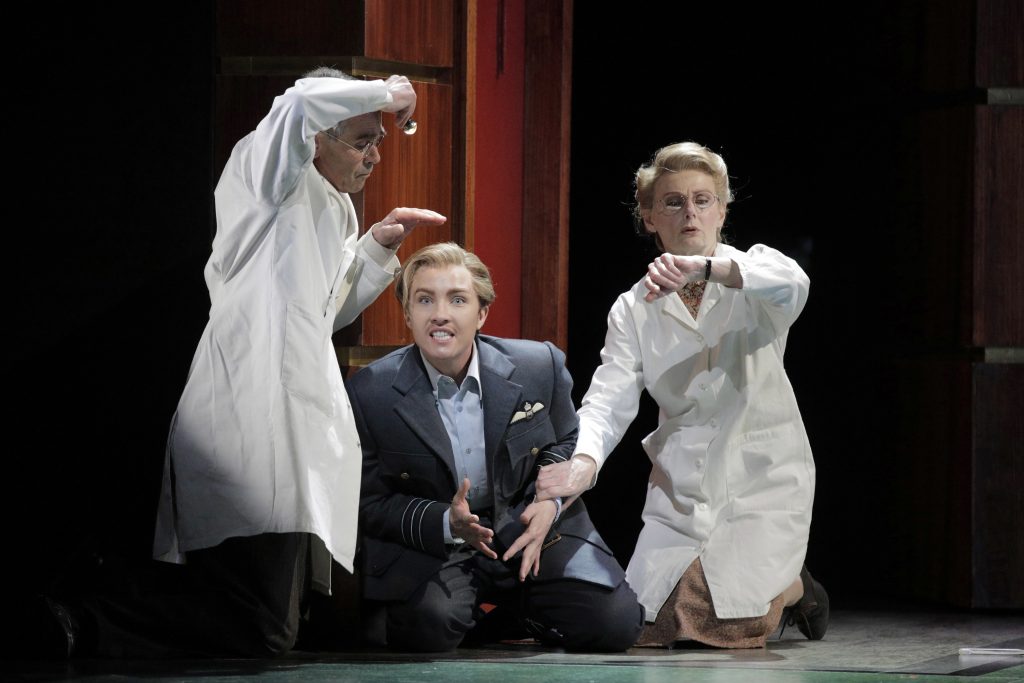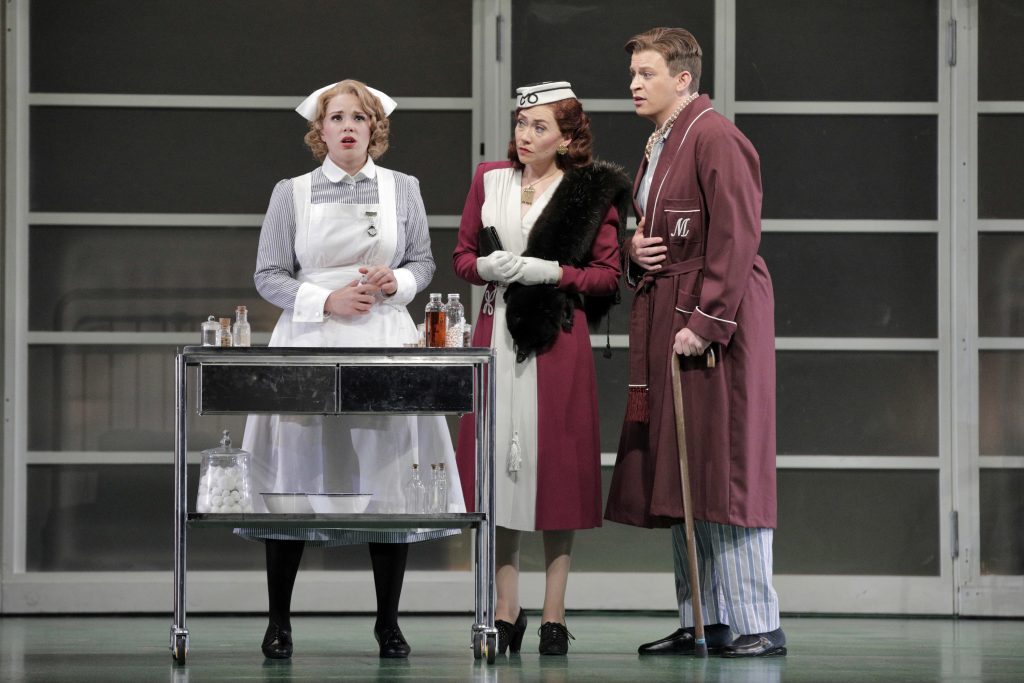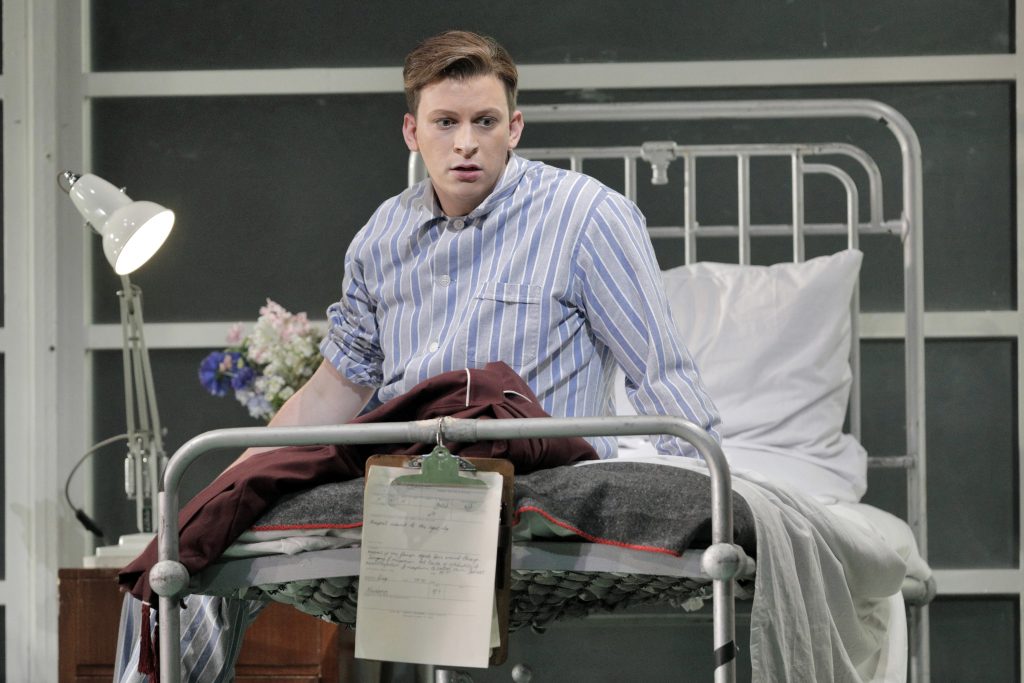
The production of Handel’s “Orlando” that opened at the San Francisco Opera on Sunday, June 9, proceeds from a brilliant theatrical concept. For an opera that turns on the conflict between love and military glory — a tension that perhaps not many of us feel particularly keenly in our own lives — director Harry Fehr finds a setting in which that tug makes perfect sense.
In place of the vague Arcadian forests and grottos of the original, Fehr places the opera in a London military hospital during the Blitz. He turns Orlando, a warrior or paladin, into a top-ranked fighter pilot whose continued health is essential to the war effort.
Suddenly, the question of whether Orlando is going to keep mooning over his beloved like a schoolboy or get back in uniform and return to fighting those blasted Jerries feels like a matter of pressing communal urgency. It’s the kind of dramatic premise worth building a vibrant operatic performance around.
But on Sunday, that vibrancy never quite arrived. This “Orlando,” the company’s first since a triumphant 1985 production built around Marilyn Horne in the title role, boasts plenty of virtues — a capable and sometimes splendid cast, lush and elegant playing from the Opera Orchestra, a crisply visual production by designer Yannis Thavoris.
What it didn’t have at the opening was a clear sense of dramatic purpose to match the conceptual cleverness on display. Once past the thematic transformation, Fehr couldn’t make the audience care consistently about the characters he’d so painstakingly conjured up. Things happened, lovers met and parted, and then the curtain went down, leaving one with that old improv catchphrase: “Yes, and?”
Some of this is baked into the opera itself, which is drawn from the Renaissance epic “Orlando Furioso” by Ariosto. As the original title makes clear, this is a piece about the madness of Orlando — about the disintegration of a noble mind under the pressures of love, and his redemption to become once again the chivalric hero he was always meant to be.

In that context, the romantic roundelay that so often makes up the confusing meat of a Baroque operatic plot — in which A loves B who loves C who loves A because she thinks he’s D in disguise — takes a sideline in “Orlando.” We get a pair of mutual lovers, Angelica and Medoro, who really want nothing more than to shake off their various suitors without hurting their feelings and slip away on a honeymoon together. There’s a shepherdess, Dorinda — here ingeniously recast as a ward nurse — and a magician, Zoroastro, whose manipulation of the plot sits entirely comfortably in the person of a smugly overconfident doctor.
It’s not easy to eke three acts’ worth of dramatic substance out of these raw materials, and although there is an occasional burst of concerted stage action, a lot of “Orlando” consists of the main characters and supers in medical uniforms bustling from here to there and back again. (It is, in that way, not unlike a real hospital.)
Stronger musical execution might have infused the proceedings with some interpretive muscle. But conductor Christopher Moulds, in a languid company debut, tended to let the tension seep out of key moments. Fast arias had soft edges that dulled their impact; slower music didn’t always get the rhythmic tension it needed.
And at the center of the opera was the wondrous mezzo-soprano Sasha Cooke, miscast and vocally out of her element in the title role. The things that make Cooke’s artistry so indispensible — a lush, velvety sonority, nuanced melodic phrasing, the ability to slow down time and draw an audience into her expressive orbit — were nowhere in evidence, or really called upon. Instead we got a singer attempting to project notes that lay far too low for her, in music that kept getting lost in the weeds.

There were much better showings from countertenor Aryeh Nussbaum Cohen as Medoro — his tone strong and gleaming, his phrasing endlessly eloquent — and from soprano Christina Gansch, whose U.S. debut as Dorinda was an amalgam of silvery vocal passagework and witty stage presence (her ability to convey both Dorinda’s lovesickness and her essential good humor about the situation was a constant delight). Soprano Heidi Stober gave a muscular, fearless and slightly acidic performance as Angelica, and bass Christian Van Horn boomed lustily along as Zoroastro.
Yet by the end, the ingenuity of the production, not only its essence but the specific modernizing correspondences (Edward VIII’s abdication as an object lesson in the dangers of love over military valor, Orlando’s sudden cure through electroshock therapy), began to feel like goals in themselves. The actual people in this musical drama became ever more difficult to discern.
“Orlando”: S.F. Opera. Through June 27. $26-$398. War Memorial Opera House, 301 Van Ness Ave., S.F. 415-864-3330. www.sfopera.com